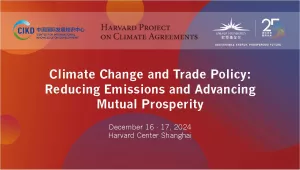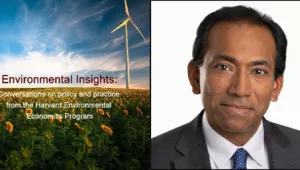Last week President Bush announced that the United States will not participate in international negotiations on the Kyoto Protocol. This 1997 agreement would govern emissions of carbon dioxide and other greenhouse gases, linked with potential global climate change. The announcement triggered predictions of disaster from some environmental groups and claims of victory from skeptics.
Both reactions may prove shortsighted. Despite legitimate concerns about the way the administration informed the world of its decision, the announcement opens the way for Bush to begin working with other nations on a credible long-term strategy. European officials publicly
condemned the US action, but in private they may have been relieved.
Many governments could not deliver on their Kyoto promises. As the Canadian environment minister said, ''''Europe adopted a position they knew would force the United States to pull out.''''
Bush''s critique of the protocol is neither new nor unique. It was shared by the Senate in its 95-0 vote in 1997. Many have expressed concern that the protocol relies on short-term emission-reduction targets for 34 industrialized countries and none for 154 other nations, despite
the fact that growth in greenhouse gas emissions over the next decades is projected to come primarily from developing economies.
But skepticism about the specific approach need not imply opposition to meaningful action. Two weeks ago Bush said that his administration takes global climate change very seriously. If he is serious, he must begin working immediately to come up with a feasible alternative to the Kyoto approach. International talks on global climate change begin in Bonn on July 16. One week later, heads of state meet in Genoa for a G8 summit. Fortunately, world leaders need not start from scratch. The Framework Convention on Climate Change, signed by Bush''s father and ratified by the Senate in 1992, provides a sensible starting point.
Within that framework, the administration can work to develop the basic architecture of an international agreement that is acceptable to Bush, the Senate, and the international community.
There is no silver bullet, but three key elements should be part of the architecture. First, all nations must be involved, if an agreement is to be truly effective. There should be an explicit mechanism for voluntary accession of developing countries to binding commitments, plus agreement on a mechanism for these countries to take on further commitments once their per capita GDP has reached agreed levels. In the short run, developing nations must board the train, but we cannot
expect them to pay for their tickets.
An appropriately structured international emissions trading program, combined with targets for developing countries that become more stringent as they become wealthier, can do the job and do it fairly.
Second, long-term targets are required for this long-term problem. (Greenhouse gases remain in the atmosphere for decades to centuries). Costs can be kept low in the short-term by employing moderate targets, which will not require drastic actions that render large parts of the capital stock prematurely obsolete. But the future severity of the climate change threat requires that more ambitious long-term targets be put in place now, to motivate needed technological change.
The third key element, and part of the Kyoto Protocol, is to work through the market, rather than against it. Market-based instruments can lower the costs of emissions reductions. Domestically, a system of tradeable permits can be used to achieve national targets by providing incentives to develop and use emissions-reducing technologies.
Internationally, a system of tradeable permits can reduce costs by as much as 75 percent by financing more climate-friendly development paths in poorer countries while sparing rich countries the most wrenching and least politically realistic adjustments.
By working with other nations to develop a new agreement, based on sound science, rational economics, and pragmatic politics, Bush can place the United States where it ought to be - in a position of leadership on this issue.
Robert Stavins is the Albert Pratt Professor of Business and Government at the John F. Kennedy School of Government at Harvard University.
This story ran on page 21 of the Boston Globe on 4/4/2001.
Stavins, Robert N. “Give Bush Time on Climate Issues.” The Boston Globe, April 4, 2001





